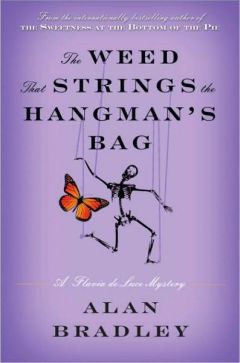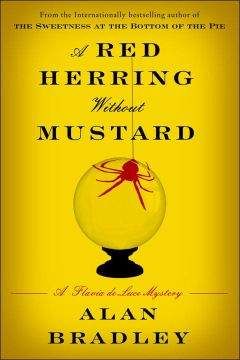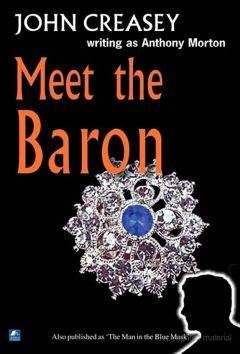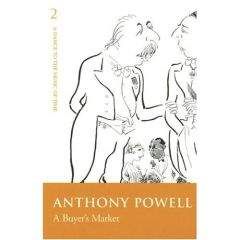Alan Bradley - The Weed That Strings the Hangmans Bag
На сайте mybooks.club вы можете бесплатно читать книги онлайн без регистрации, включая Alan Bradley - The Weed That Strings the Hangmans Bag. Жанр: Прочее издательство неизвестно,. Доступна полная версия книги с кратким содержанием для предварительного ознакомления, аннотацией (предисловием), рецензиями от других читателей и их экспертным мнением.
Кроме того, на сайте mybooks.club вы найдете множество новинок, которые стоит прочитать.
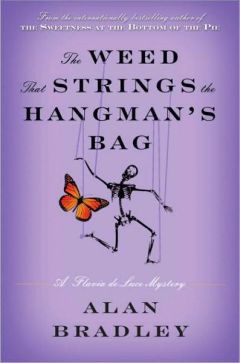
Alan Bradley - The Weed That Strings the Hangmans Bag краткое содержание
The Weed That Strings the Hangmans Bag читать онлайн бесплатно
"I wonder how Nialla's getting on with her bath?" I remarked brightly, as we drove up the avenue of chestnuts to Buckshaw.
Cynthia stared straight ahead, gripping the wheel.
"Nonsense!" Aunt Felicity declared. "We shall go as a family."
We were in the drawing room, spread as widely apart as was humanly possible.
Father muttered something about stamp albums, and I could see that Daffy was already holding her breath in an attempt to feign a fever.
"You and your girls need to get out more, Haviland. You're all of you as pale as jellyfish. It will be my treat. I shall have Clarence bring round his car as soon as we've eaten."
"But — " Father managed.
"I shall brook no buts, Haviland."
Outside, Dogger was weeding at the edge of the terrace. Aunt Felicity rapped sharply on the windowpane to get his attention.
"Yes, miss?" he said, coming to the French doors, straw hat in hand.
"Ring up Clarence and tell him we shall require a taxi for seven at six-thirty."
"Six-thirty, miss?" Dogger asked, his brow furrowed.
"Of course," Aunt Felicity said. "He'll have to make two trips. I expect you and Mrs. Mullet would both have your noses out of joint if you were left behind. Puppet shows are not just for bluebloods, you know."
"Thank you, miss," Dogger said.
I tried to catch his eye, but he was gone.
* TWELVE *
CLARENCE PULLED UP AT the lych-gate at twenty minutes to seven. He came round the taxicab to hold the door open for Aunt Felicity, who had insisted on sitting in the front seat with him in order to, as she put it, "keep a sharp eye out for road hogs."
She had dressed herself in a sort of comic-opera cape over a voluminous red silk suit that might have been pinched from a Persian harem. Her hat was a collapsed black bag with a peacock's feather billowing out behind like smoke from the Flying Scotsman; on her feet were a pair of medieval slippers in mustard yellow, with long upturned points like a pair of icing bags. When we arrived at the parish hall, Father and Feely got out on the far side of the taxicab.
"Now off you go to fetch the others, Clarence," Aunt Felicity commanded, "and don't dawdle."
Clarence raised a forefinger to the peak of his cap and, with an impertinent shifting of gears, was gone.
Inside the parish hall, we found that the entire front row of chairs had been reserved for us. Aunt Felicity had certainly not skimped on the cost of tickets. She and Father were to sit front and center, with Feely and Daffy on their left. I was on Father's right, with Dogger and Mrs. Mullet (when they arrived) on our flank.
All was in readiness. The house lights had already been lowered to a level of delicious expectation. Incidental music floated from backstage, and from time to time, the red velvet curtains on the puppet stage gave an enticing twitch.
The entire population of Bishop's Lacey seemed to be there. Mutt Wilmott, I saw, had taken a seat against the wall near the back. Miss Cool was in the row behind him, listening to Cynthia Richardson, who had her ear, and behind her sat Miss Mountjoy, the niece of the late Dr. Twining, Father's old schoolmaster. To Miss Mountjoy's right, from Culverhouse Farm, Dieter Schrantz and Sally Straw, the Land Girl, sat side by side. I gave them a little wave, and both of them grinned.
"Haroo, mon vieux — Flavia!"
It was Maximilian Wight, our diminutive neighbor who, after several triumphant world tours as a concert pianist, had settled down at last in our village to teach music. Feely had been one of his pupils, but had begged off her lessons when Max began asking too many intrusive questions about her "paramours."
Max waved a white glove, and I waved back.
As I scanned the rows of faces, my eyes skidded to a stop on a dark-haired woman in a sage green sweater set. She was no one I had seen before, and must be, I thought, a stranger to Bishop's Lacey. Perhaps a visiting relative.
The man beside her saw me staring, and gave me a pleasant smile: Inspector Hewitt. It was not so long since I had assisted him in bringing a murderer to justice.
In a flash I was standing before them, shifting awkwardly from foot to foot as I realized I was probably intruding.
"Fancy meeting you here," the Inspector said. It was not a particularly original comment, but it neatly covered what might have been an awkward moment.
"Antigone," he told the dark-haired woman, "I'd like you to meet Flavia de Luce."
I knew for a fact that she was going to say, "Oh, yes, my husband has mentioned you," and she would say it with that little smirk that tells so much about the amused conversation that had followed.
"I'm so pleased to meet you, Flavia," she said, putting out the most beautiful hand in the world and giving me a good solid shake, "and to find that you share my love of marionettes."
If she'd told me to "fetch" I would have done it.
"I love your name," I managed.
"Do you? My father was Greek and my mother Italian. She was a ballet teacher and he was a fishmonger, so I grew up dancing in the streets of Billingsgate."
With her dark hair and sea green eyes, she was the image of Botticelli's Flora, whose features adorned the back of a hand mirror at Buckshaw that Father had once given to Harriet.
I wanted to ask "In what far isle is your shrine? that I might worship there," but I settled for shuffling my feet and a mumbled, "Nice to meet you, Mrs. Hewitt. I hope you and Inspector Hewitt enjoy the show."
As I slipped into my seat, the vicar strode purposefully to the front of the hall and took up a position in front of the stage. He smiled indulgently, waiting, as Daffy, Mrs. Mullet, and Dogger slid into their seats.
"Ladies and gentlemen, boys and girls, parishioners of St. Tancred's and otherwise, thank you for coming. We are honored, this evening, to welcome to our midst, the renowned puppet-showman — if he will allow me to make use of that illustrious nomenclature — Rupert Porson."
(Applause)
"Although Mr. Porson, or Rupert, if I may, is best known nowadays for his performances on the BBC Television of The Magic Kingdom which, as I'm sure all of you know, is the realm of Snoddy the Squirrel ..."
(Applause)
"... I am told on good authority that he has traveled widely, presenting his puppet artistry in all of its many forms, and has, on at least one occasion, performed before one of the crowned heads of Europe."
(Applause)
"But before Jack sells his mother's cow for a handful of beans — "
"Hssst! Don't give away the plot, Vicar!"
(Tully Stoker, the proprietor and landlord of the Thirteen Drakes, greeted with hoots of laughter, including his own.)
"... and while the maestro prepares his enchanted strings, the Ladies' Auxiliary of St. Tancred's is pleased to present, for your musical entertainment, the Misses Puddock, Lavinia and Aurelia."
Oh, Lord! Spare us! Please spare us!
We had been saved from having to listen to them during the matinee performance only because their St. Nicholas Tea Room kept them too busy to attend.
The Misses Puddock had a death grip on public events at St. Tancred's parish hall. No matter if it was a tea put on by the Ladies' League, a whist drive by the Altar Guild, a white elephant sale by the Ladies' Auxiliary, or a spring flower show by the Vestry Guild, the Misses Puddock would perform, winter or summer, rain or shine.
Miss Lavinia would seat herself at the upright piano, rummage in her string bag, and fish out at last a tattered piece of sheet music: "Napoleon's Last Charge."
After an interminable wait — during which she would thrust her face forward until her nose was touching the music — she would sit back, her spine stiff as a poker, raise her hands above the keyboard, drop them, take a second squint at the music, and then tear into it like a grizzly bear clawing at a salmon in the Pathe newsreels.
When she was finished, her sister, Miss Aurelia, would take up her position, her white-gloved fingertips idly brushing the dusty piano top, and warble (there's no other word for what she did) "Bendemeer's Stream."
Afterwards, the chairman would announce that the Vestry Guild had voted unanimously to present the Misses Puddock with an honorarium: "a purse of appreciation," as he always put it.
And they're off!
Miss Lavinia, her eyes riveted to the music, was into "Napoleon's Last Charge," and I noticed for the first time that, as she read the music, her lips were moving. I couldn't help wondering what she was saying. There were no lyrics to the piece — could she be naming the chords? Or praying?
Mercifully, she took it at a somewhat faster gallop than usual, and the thing was soon over — at least, relatively speaking. I noticed that Feely's jaw muscles were twitching, and that Max looked as if he were biting down on a stainless-steel humbug.
Now it was Miss Aurelia's turn. Miss Lavinia pounded out the first few bars as an introduction before her sister joined in:
"There's a bower of roses by Bendemeer's Stream
And the nightingale sings round it all the day long.
At the time of my childhood 'twas like a sweet dream."
(Miss Aurelia's childhood, to look at her, must have been during George the Third.)
"To sit in the roses and hear the bird's song."
When she finished, there was a smattering of polite applause, and Miss Aurelia stood with her head cocked for a few moments, checking the piano with her fingers for dust, waiting to be coaxed into an encore. But the audience, knowing better than to encourage her, settled quickly back into their seats, and some of us crossed our arms.
As the house lights went down, I turned round for one last look at the audience. A couple of latecomers were just taking their seats on the aisle. To my horror, I saw that they were Gordon and Grace Ingleby, she in her usual dreadful black outfit, he with a bowler hat, for God's sake! And both of them looking less than happy to be there.
At first, I felt anger rushing up and fluttering within my chest. Why had no one warned them? Why had no one cared enough to keep them away?
Why hadn't I?
Crazily, the thing that popped into my mind was something Daffy once told me: It is the duty of a constitutional monarch to warn and advise.
If His Royal Majesty, King George the Sixth, had been among us this evening, he would be bound to take them aside and say something about the puppet with their dead child's face. But he was not.
Besides, it was already too late.... The hall was in total darkness. No one but me seemed to have noticed the Inglebys.
And then the show began. Because of the interminable Misses Puddock, I suppose, Rupert had decided to cut out the Mozart sketch and go straight for the main feature.
The red velvet curtains opened, just as they had in the afternoon, revealing the widow's cottage. The spotlight came up to illuminate Nialla in her Mother Goose costume. Grieg's "Morning" floated in the air, painting haunting images in the mind of dark forests and icy fjords.
"Once upon a time, in a village not far away," Nialla began, "there lived a widow with a son, whose name was Jack."
And in came Jack: the Jack with Robin Ingleby's face.
Again, the audible sucking-in of breath as some of the audience recognized the dead boy's features. I scarcely dared turn and look, but by pretending my skirt had become pinched in the folding mechanism of the chair, I was able to twist round in my seat just far enough to sneak a look at the Inglebys. Grace's eyes were wide and staring, but she did not cry out; she seemed frozen to the spot. Gordon was clutching at her hand, but she took no notice.
On the stage, the puppet Jack shouted: "Mother, are you at home? I want my supper."
"Jack was a very lazy boy," said Mother Goose. "And because he refused to work, it was not long before his mother's small savings were completely gone. There was nothing to eat in the house, and not so much as a farthing left for food."
As the gasps and the murmurs died down, the show went on. Rupert was in fine form, the puppets so convincing in their movements and so perfectly voiced that the audience soon fell under his enchantment — as the vicar had suggested they would.
Lighted by the colored lamps of the stage, the faces of the people around me were the faces in a painting by Toulouse-Lautrec, red, overheated, and fiercely intent upon the little wooden actors. As Aunt Felicity crunched excitedly on a digestive mint, I noticed that even Father had a half-amused look on his face, though whether it was caused by the puppets or his sister, I could not decide.
The business of the cow and the beans and the kick in the pants was greeted with even more raucous laughter than it had been at the afternoon performance.
Mouths (including even Daffy's) fell open as the beanstalk grew while Jack slept, and the audience began nudging one another with delight. By the time Jack climbed the beanstalk into the giant's kingdom, Rupert had all of Bishop's Lacey eating out of his hand.
How was Mutt Wilmott reacting to this success? I wondered. Here was Rupert, obviously at his best in a live (so to speak) performance, with no television apparatus — wonderful as it was — standing between him and his audience. When I turned to look, I saw that Mutt was gone, and the vicar had taken his chair.
More oddly, Gordon Ingleby, too, was no longer present. His chair stood empty, but Grace still sat motionless, her vacant eyes fixed on the stage, where the giant's wife had just hidden Jack in her great stone oven.
"Fee! Fie! Fo! Fum!" the giant roared as he came into the kitchen. "I smell the blood of an Englishman!"
"Jack leapt out of the oven ...," said Mother Goose.
"Master! Master!" cried the charming puppet harp, plucking at its own strings in agitation. This was the part I liked best.
"... grabbed the golden harp, and took to his heels, with the giant close behind!"
Down the beanstalk came Jack, the green leaves billowing round him. When the vegetation thinned out at last, the scene had changed to his mother's cottage. It was a marvelous effect, and I couldn't for the life of me see how Rupert had done it. I would have to ask him.
"Mother! Mother! Fetch the axe!" Jack shrieked, and the old lady came hobbling round from the garden — oh, so slowly! — with the hatchet in her hand.
Jack threw himself at the beanstalk with all his might, the axe flying fast and furious, the beanstalk shrinking back again and again as if in agony from the wickedly glinting blade.
And then, as it had done before, the beanstalk sagged, and crumpled to the ground.
Jack seemed to be looking up as, with a sound like thunder, the giant came crashing down from the sky.
For a few moments, the monster lay twitching horribly, a trickle of ruby blood oozing from the corner of its mouth, its ghastly head and shoulders filling the stage with flying sparks, as smoke and little flames rose in acrid tendrils from its burning hair and goatee. But the blank eyes that stared out unseeing into mine were not those of the hinged giant, Galligantus — they were the glazed and dying eyes of Rupert Porson.
Похожие книги на "The Weed That Strings the Hangmans Bag", Alan Bradley
Alan Bradley читать все книги автора по порядку
Alan Bradley - все книги автора в одном месте читать по порядку полные версии на сайте онлайн библиотеки mybooks.club.
